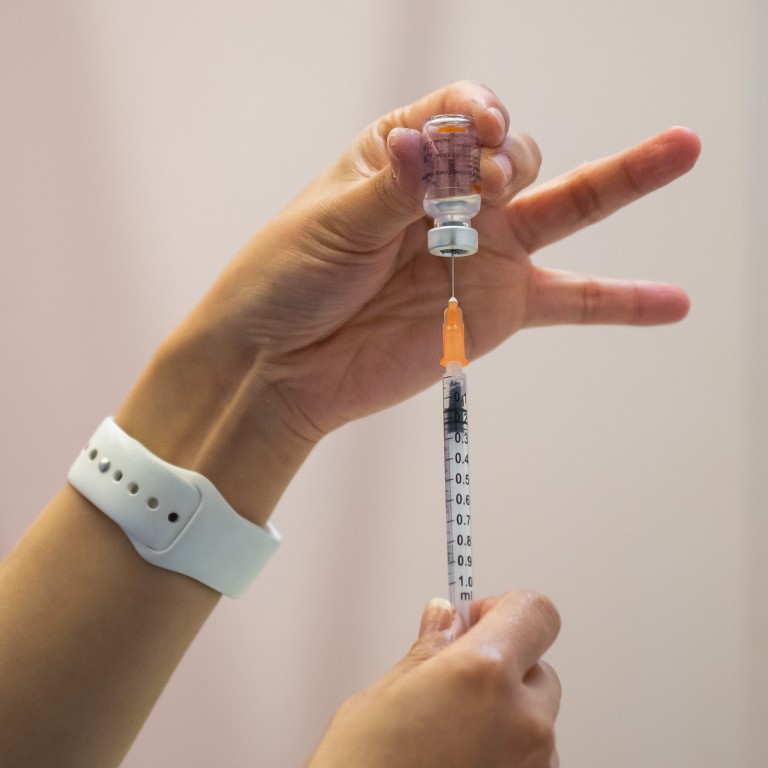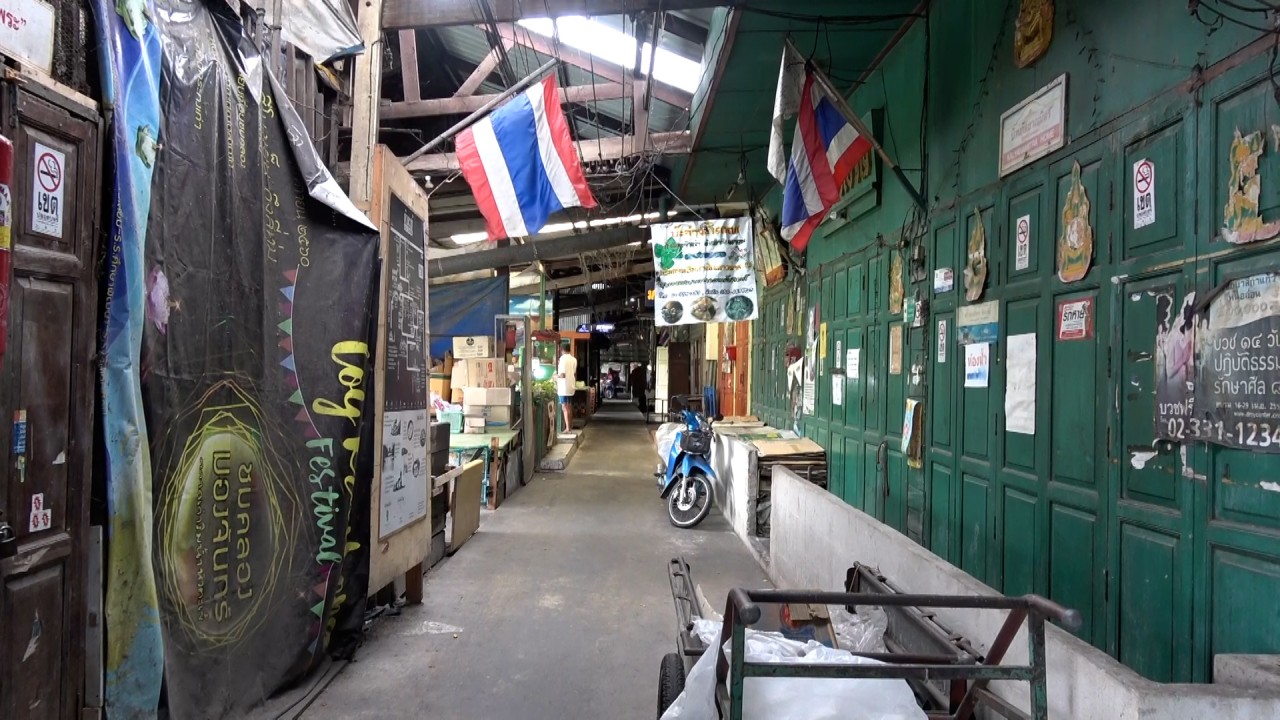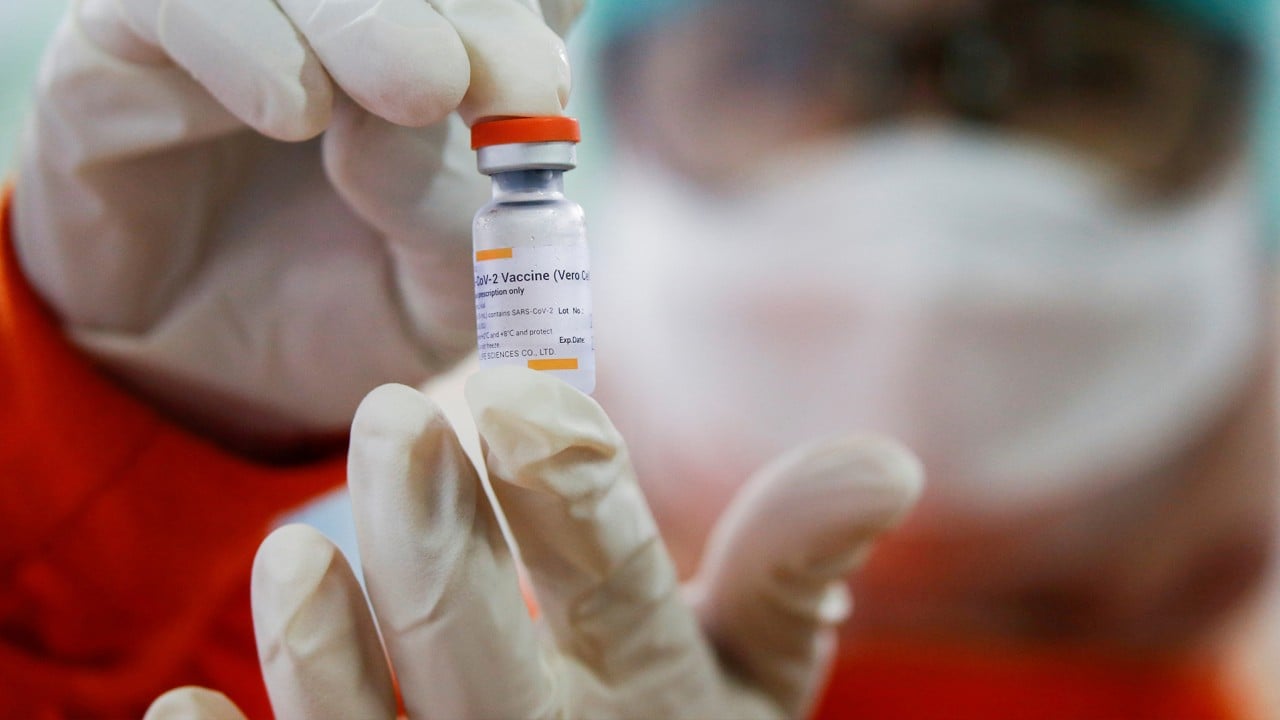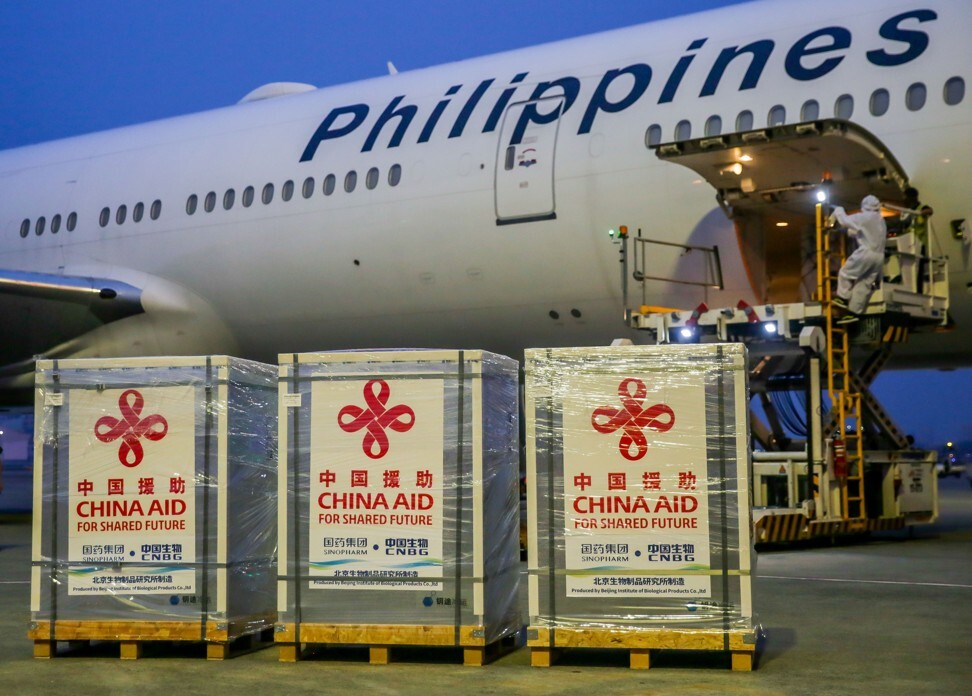
What’s behind Southeast Asia’s hesitancy towards China-made vaccines?
- Beijing has supplied 190 million doses of its home-grown inoculations to the region, but public perceptions towards Sinovac and Sinopharm are negative
- In the likes of Indonesia, Malaysia, and Singapore, factors including efficacy and religious concerns as well as anti-China sentiment are behind this selective hesitancy
Several polls undertaken since late 2020 – by different organisations including YouGov, Kompas, Indikator, Suan Dusit, and using different sampling methods – paint a mixed picture of public perceptions towards Chinese vaccines in these countries.
Covid-19: Singapore residents who took Sinovac turn to Pfizer to up their antibody counts, amid debate on booster shots
General Covid-19 vaccine hesitancy
While massive Covid-19 outbreaks in each of the six countries above have driven up vaccine willingness, a number of surveys in the region indicate that general vaccine hesitancy is largely attributed to concerns about effectiveness, safety, and fears about side effects.
For instance, 25 out of the 30 participants interviewed for a study in September last year expressed their “disbelief” about Covid-19, describing it as “a common cold, flu, and cough” that “has been blown out of proportion by the government” – even though Indonesia was at the time recording 4,000 new cases and 100 deaths daily.
Public scepticism about the existence and severity of Covid-19 feeds into vaccine hesitancy, especially in the wake of anti-vaccine disinformation campaigns. In the Philippines, anti-vaccine theories peddled by United States-based evangelical Christian groups have filtered into local church networks and Facebook discussion groups.

01:03
Once-bustling Bangkok market deserted as Thailand struggles with its worst wave of Covid-19
Even politicians are not averse to indulging in such anti-vaccine rhetoric. In December last year, Tengku Razaleigh Hamzah, Malaysia’s longest-serving parliamentarian, repeated the claims of British anti-vaxxer Michael Yeadon that vaccines were unnecessary because “people around the world are acquiring the natural herd immunity”.
Another reason for vaccine hesitancy in the region could be the lack of trust in government vaccination programmes. This is salient in the Philippines and Indonesia, both having recently mismanaged vaccination campaigns involving children.
In April 2016, the Philippines introduced a plan to vaccinate all nine-year-olds with the dengue vaccine Dengvaxia, only for the manufacturer to reveal a year later that it could cause previously unvaccinated people to be more susceptible to more severe dengue infections in future.
The Dengvaxia controversy saw vaccine confidence in the Philippines plummet from 93 per cent in 2015 to 32 per cent in 2018.
Similarly, in Indonesia, the world’s most populous Muslim nation, the campaign in 2018 to inoculate children against measles and rubella faltered after it was revealed that the vaccine contained “negligible traces of pork gelatin”.
Coronavirus: why did North Korea turn down 3 million Sinovac vaccine doses?
The selective hesitancy towards Chinese-made shots in Southeast Asia is partly an extension of the general vaccine hesitancy due to the considerations above – but other issues play a part too.
Efficacy and religious concerns
Thus, in the absence of clarity about their efficacy rates, public confidence in China’s home-grown vaccines is likely to take a hit, especially when real-world developments suggest that these vaccines may not offer robust protection against newer Covid-19 variants.
For example, Sinovac’s effectiveness remains mired in doubt, compounded by the company’s reluctance to promptly publish their trial data or actively address the diverging efficacy results. According to separate clinical trials, Sinovac’s protection rate varies between 50 per cent to 90 per cent – the vaccine was 83.5 per cent effective in a Turkish study, but data from Indonesia and Brazil placed it at only slightly above 50 per cent.
Sceptics of Chinese-made vaccines also look to Singapore’s reluctance to fully integrate Sinovac into its national vaccination programme. Health regulators had requested for additional clinical data from Sinovac in March, but this was only submitted in July. As a result, even though 200,000 shots had arrived in the island nation in February, Sinovac was only released through a select number of private clinics in June.
Those interested in Sinovac were however warned by a senior health ministry official about the “significant risk of vaccine breakthrough”. Moreover, recipients of Sinovac were not regarded as being “properly vaccinated” until early August, when the authorities decided to recognise all vaccines approved by the World Health Organization for emergency use.
Public confidence in the Chinese vaccines is unlikely to improve with the reports of Covid-19’s resurgence in countries that had primarily relied on either Sinovac or Sinopharm. This includes Indonesia, where Sinovac’s early success story is going awry.
In May, the Indonesian health ministry announced that a study of 130,000 Indonesian health care workers showed that Sinovac was at least 90 per cent effective in preventing symptoms, hospitalisation and death. However, the emergence of the Delta variant has pushed Indonesia’s Covid-19 tally to almost double over two months, reaching close to 3.5 million cases by early August, with around 48,000 deaths.
These figures include a growing number of Indonesian health care workers who died from Covid-19 despite being fully vaccinated (often with Sinovac).

Similar doubts about the reliability of Chinese vaccines against Delta have emerged in other countries around the region. A group of doctors in Thailand have protested the government’s decision not to prioritise medical personnel for a Pfizer booster shot as worries grew after 618 Thai health care workers were infected between April and July despite being double-jabbed with Sinovac.
In Malaysia, Director-General of Health Noor Hisham Abdullah’s assurance that both “Sinovac and Pfizer are equally effective against Covid-19” was greeted with a measure of incredulity, with some taking to his Facebook page to accuse him of cherry-picking the data and ignoring Sinovac’s weaker performance against newer variants.
It was also reported that many Filipinos skipped their appointments at vaccination centres that were using Sinovac, while a crowd formed at another centre offering Pfizer shots. Similar sentiments can be found in Vietnam and Thailand, where Chinese products – including vaccines – are seen as lacking “a good reputation for quality” or being “second-rate”.
Thailand defends Sinovac-AstraZeneca vaccine ‘mix-and-match’ after WHO warning
For the Muslim-majority countries of the region, a religious element drives Covid-19 vaccine hesitancy in general and reluctance towards Chinese vaccines in particular. Studies have indicated that religious concerns motivated 20.8 per cent and 8 per cent of vaccine hesitancy in Malaysia and Indonesia respectively.
For one, the Chinese provenance of Sinovac has generated misgivings about its halal status, especially in Indonesia after the measles-rubella vaccine fiasco. To assuage these worries, religious authorities in both countries have taken pains to assure that Sinovac was indeed halal. Politicians, including Indonesian President Joko Widodo and Malaysian vaccine chief Khairy Jamaluddin, also did their part to convince their citizens by taking the Sinovac jabs themselves.
Intertwining concerns about the reliability and religious permissibility of Chinese vaccines may explain the relatively lower vaccination rates in southern Thailand. In the Muslim-majority provinces of Pattani, Yala and Narathiwat, those who have taken the jabs tended to be Buddhists. Many locals doubted Sinovac’s efficacy and subscribed to the misinformation-driven religious fear that “Islam did not allow such medical measures”.
These objections to Sinovac are also informed by the region’s deep-seated mistrust of the Thai state following decades of secessionist struggle, a factor that will be explored further in the next section.

Political factors: distrust of national governments and China
Misgivings about their reliability aside, public perceptions of the Chinese vaccines in some Southeast Asian countries have also been affected by domestic politics and popular suspicions of China.
This is particularly true of Thailand, which saw a sharp decrease in public willingness for vaccination in recent months, bucking the region’s trend. Thailand has had to rely on Sinovac for the early phase of its vaccine roll-out, primarily due to the lack of alternatives.
According to analyst Tita Sanglee, widespread distrust of the government of Prime Minister Prayuth Chan-ocha is “aggravating Sinovac hesitancy in the country”, and “Sinovac faces politically motivated problems”.
This signals both a rejection of Prayuth as well as Thailand’s increasing tilt towards China under his leadership. Major opposition parties such as Pheu Thai and Move Forward Party have raised questions about the safety and efficacy of the Sinovac vaccine, while the pro-democracy movement demanded that the government drop Sinovac in favour of Pfizer and Moderna when they took the streets in mid-July.
Foreigners in Indonesia’s Jakarta are finding it harder to get Covid-19 vaccines than in Bali
In the case of Vietnam, it is popular distrust of China, rather than lack of confidence in the government, that affects public perception of Chinese vaccines. Hanoi remains reluctant to buy Chinese vaccines, except in limited numbers for emergency situations. Apart from concerns about efficacy, this decision is likely due to the prevalent public wariness of Beijing – China’s trust deficit in Southeast Asia is most pronounced in Vietnam, according to Pew polling data and the annual State of Southeast Asia Surveys by ISEAS.
Such anti-China feelings, seemingly ingrained among the Vietnamese public, explain the largely negative reaction to China’s donation of 500,000 Sinopharm doses in June. On local mainstream and social media, many rejected the vaccine outright, either out of visceral anti-China attitudes or an entrenched distrust of made-in-China products.
An overwhelming majority were willing to wait and pay more to get their top vaccine choices of Pfizer and Moderna, while some would rather choose AstraZeneca, Russia’s Sputnik V or Vietnam’s home-grown vaccines. However, public acceptance of Chinese vaccines could grow since alternatives remain in short supply while new infections are sweeping across southern Vietnam. The authorities of badly hit Ho Chi Minh City recently allowed the import of 5 million Sinopharm doses.

01:30
WHO approves Sinovac Biotech’s coronavirus vaccine for emergency use
Pockets of enthusiasm
All the same, there remain pockets of enthusiasm for Chinese vaccines. Among Singaporeans doubtful about the newer mRNA-based vaccines, Sinovac and Sinopharm have some appeal since they rely on the “more established” technology of using an inactivated virus.
The two Chinese-made inoculations are also attractive options for those with extensive links or travel plans to China. In March, Beijing announced that it would simplify visa applications for foreigners immunised with a Chinese vaccine. Immigration considerations also underlined the agreement between Vietnam and China to reserve the 500,000 Sinopharm shots for Chinese nationals living in the country, Vietnamese citizens heading to China for work and study, and those living in the border areas.
Public reactions to Chinese vaccines, which largely trend negative, suggest a non-linear relationship between China’s vaccine diplomacy and its soft power in the region – especially at the popular level. Support for Chinese vaccines appears sporadic compared with the widespread doubts on the ground about their reliability, be it scientifically informed or fuelled by misinformation.
China has its work cut out to improve public confidence in its vaccine offerings and made-in-China products more generally. Furthermore, with populist anti-China narratives against reliance on Sinopharm and Sinovac emerging in some parts of the region, it remains to be seen whether Beijing will succeed in projecting an image of a more “reliable, lovable and respectable China” among ordinary Southeast Asians.
Singapore scientists pursue booster vaccine to counter Covid-19 variants, other coronaviruses
Going forward, public opinions of Chinese vaccines in Southeast Asia will be subject to the pandemic’s unpredictable trajectory. For some Southeast Asian countries, Chinese vaccines may be the only viable choice for large-scale vaccinations if other vaccine manufacturers are not able to provide prompt and sufficient supplies. Given the ongoing surge of infections in the region, the counsel by Indonesia’s health minister that “a good vaccine is the one that is available” still holds true. The emergence of newer variants and the need for booster shots could also change how the various vaccines are perceived. Furthermore, the “mixing and matching” method of different vaccines, pioneered by Thailand and under consideration by the Philippines and other countries, suggests a pathway where Chinese and other vaccines could be deployed in a complementary rather than mutually exclusive way.
Another potential game-changer is China’s venture into mRNA-based Covid-19 vaccine development. If successful, this will significantly improve the appeal of China’s future vaccine offerings in the region. The game of vaccine diplomacy is not over yet.
Khairulanwar Zaini is Research Officer, and Hoang Thi Ha is Fellow and Co-coordinator of the Regional Strategic and Political Studies Programme at ISEAS – Yusof Ishak Institute.
This article first appeared in the publication ISEAS Perspective 2021/115, under the title “Understanding the Selective Hesitancy towards Chinese Vaccines in Southeast Asia”.



